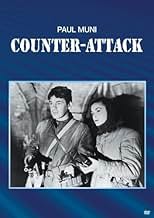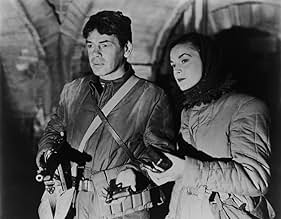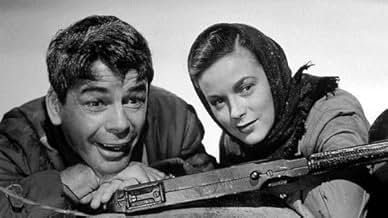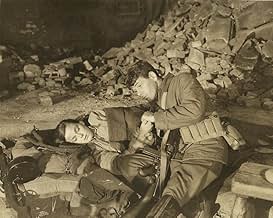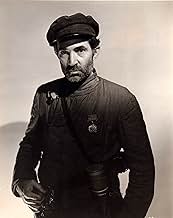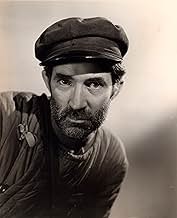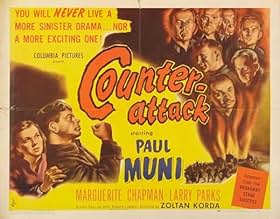During WW2, a Mexican stand-off ensues between a group of German soldiers and a team of Soviet fighters trapped together in the basement of a bombed-out Russian building.During WW2, a Mexican stand-off ensues between a group of German soldiers and a team of Soviet fighters trapped together in the basement of a bombed-out Russian building.During WW2, a Mexican stand-off ensues between a group of German soldiers and a team of Soviet fighters trapped together in the basement of a bombed-out Russian building.
Wolfgang Zilzer
- Krafft
- (as Paul Andor)
Louis V. Arco
- German Colonel
- (uncredited)
John Bagni
- Paratrooper
- (uncredited)
Trevor Bardette
- Petrov
- (uncredited)
Richard Bartell
- Ostrovski's Assistant
- (uncredited)
Featured reviews
Recently saw this movie on TCM. Very powerful. It concerns a Russian soldier (Paul Muni) and a female resistance agent (well played by Marguerite Chapman, who I'm not familiar with) trapped in a bombed factory (?) with seven Germans. The director has some better known films, including "Four Feathers." Muni is well known. The others appear to be character actors.
It becomes a battle of wills, most of the action taking place in a condensed space -- the small area they are trapped in. But, meanwhile, we also get some excellent shots of the happenings outside in the battlefield and thereabouts. These add a nice touch to the movie, realistically so as well (a sort of newsreel feel in some cases).
The movie has a 1945 publication date but is played basically straight. It is always interesting as well when Russians are the good guys.
It becomes a battle of wills, most of the action taking place in a condensed space -- the small area they are trapped in. But, meanwhile, we also get some excellent shots of the happenings outside in the battlefield and thereabouts. These add a nice touch to the movie, realistically so as well (a sort of newsreel feel in some cases).
The movie has a 1945 publication date but is played basically straight. It is always interesting as well when Russians are the good guys.
Counter-Attack, a film celebrating the Russian contribution to the victory of Nazism, earned a place in history for the blacklisting of screen writer John Howard Lawson, member of the Hollywood Ten and a guy who really was a Marxist. He never denied it during his lifetime.
Nevertheless the Russian contribution was certainly real enough and red enough and that's not a political statement either. Paul Muni and Marguerite Chapman play a pair of Russian soldiers who get trapped on the wrong side of the front in a cellar with seven members of the German Army of varying feelings about their leader. Muni and Chapman are on an advance mission to obtain intelligence and they're certain one of their 'prisoners' is an officer in disguise. How to ferret the information from these men is the question.
The film is one claustrophobic exercise and on stage it was done only on the one set of the cellar. It was based on a Russian play Pobyeda and ran under the name Counter-Attack on Broadway during the 1943 season for 85 performances. Morris Carnovsky originated the role Paul Muni has in the film.
Since both sides have no idea who will rescue them eventually it becomes quite a cat and mouse game with Muni and Chapman fighting fatigue. Yet they have a few tricks of their own.
Counter-Attack is a well acted film with Paul Muni under a lot of effective directorial restraint and the ever present helpful hints from his wife Bella. They were one interesting combination, Bella knew her man well and was his best critic. Of course directors getting the idea that they were in charge did not want her around. Harry Cohn got her off the set of A Song To Remember and without her there, the result was Muni's hammiest performance.
Counter-Attack is not a great war film and it got buried during the McCarthy era. Still it's decent enough wartime propaganda and we can view it now with the history of the times in mind.
Nevertheless the Russian contribution was certainly real enough and red enough and that's not a political statement either. Paul Muni and Marguerite Chapman play a pair of Russian soldiers who get trapped on the wrong side of the front in a cellar with seven members of the German Army of varying feelings about their leader. Muni and Chapman are on an advance mission to obtain intelligence and they're certain one of their 'prisoners' is an officer in disguise. How to ferret the information from these men is the question.
The film is one claustrophobic exercise and on stage it was done only on the one set of the cellar. It was based on a Russian play Pobyeda and ran under the name Counter-Attack on Broadway during the 1943 season for 85 performances. Morris Carnovsky originated the role Paul Muni has in the film.
Since both sides have no idea who will rescue them eventually it becomes quite a cat and mouse game with Muni and Chapman fighting fatigue. Yet they have a few tricks of their own.
Counter-Attack is a well acted film with Paul Muni under a lot of effective directorial restraint and the ever present helpful hints from his wife Bella. They were one interesting combination, Bella knew her man well and was his best critic. Of course directors getting the idea that they were in charge did not want her around. Harry Cohn got her off the set of A Song To Remember and without her there, the result was Muni's hammiest performance.
Counter-Attack is not a great war film and it got buried during the McCarthy era. Still it's decent enough wartime propaganda and we can view it now with the history of the times in mind.
I was 7 years old when I saw this movie in 1945. the war swirled around me and this was a movie about success against an enemy of America. At 7, you have no political insights as to what is going on. It's the "good guys vs. the bad guys", the "cowboys vs. the indians" from a little kids perspective, and I was for the good guys, which in this case were the Russians. I guess it was OK to root for the Russians as long as we had a common enemy. This was my first exposure to propaganda movies, but not my last. When Paul Muni and Larry parks were identified as "Commie supporters" after the war was over, they paid a price for what they believed in. With the Communist conspiracy lurking, this hysteria impacted and destroyed a lot of people, a sad day for our country. Obviously, this movie made an impact on me, as it still is one of my favorites, all politics aside. From a historical perspective, it showed, that the Russians weren't always our enemies, a fact we would rather not acknowledge today. I guess it will always hold true, that "the enemy of my enemy, is my friend".
Most of "Counter-Attack" takes place in a collapsed factory building in which 2 Russians and 7 Germans are trapped. Ordinarily, in a picture of this type, the action comes to a screeching halt and the film becomes a talkathon. But the story benefits greatly from the presence of Paul Muni, one of America's great actors, as the Russian soldier who is holding the 7 German soldiers captive until rescuers arrive.
The Russians are trying to drive the Germans from Russian soil, and have sent a handful of paratroopers ahead to gather information on troop movements, and the group is trapped after an explosion at a factory doubling as a German messaging outpost. That the film does not perish from Death by Dialogue is a tribute to Paul Muni's superior acting ability as well as an excellent script. If it comes on soon, catch it and see if you don't agree.
The Russians are trying to drive the Germans from Russian soil, and have sent a handful of paratroopers ahead to gather information on troop movements, and the group is trapped after an explosion at a factory doubling as a German messaging outpost. That the film does not perish from Death by Dialogue is a tribute to Paul Muni's superior acting ability as well as an excellent script. If it comes on soon, catch it and see if you don't agree.
Seldom does a film capture the tone of the moment of significant historical events. This movie indeed does. One of the most dramatic events of World War Two was the counter attack by the Soviet troops against the Nazi invaders. The power of it all is beyond comparison to this very day. This film gives the audience a good account of the action, the drama, and the sense of just how far the Russians would go to drive the German army from its land. Paul Muni is extraordinary, and his acting gives meaning to the theme of this film that "there is no such word as impossible." In this movie, the heroic revenge of the Russians is exceeded only by the terror of it all.
Did you know
- TriviaUnderwater bridges were a real Soviet Army engineering feat used in WWII. A report on such submerged bridges was published in the U.S. War Department's journal "Tactical and Technical Trends", no. 29, July 15, 1943.
- Crazy creditsOpening credits prologue: In 1942, Russia had been invaded to a depth of a thousand miles, and her armies seemed crushed. The world didn't know that these same "beaten" armies would turn, take back every foot of ground they had lost and then invade Germany itself.
One night in this same year, 1942 . . . .under cover of fog . . . .Russian engineers were engaged in a strange activity . . . .on a river, facing the German lines . . . . .
- ConnectionsReferenced in The Way We Were (1973)
Details
- Runtime
- 1h 30m(90 min)
- Color
- Aspect ratio
- 1.37 : 1
Contribute to this page
Suggest an edit or add missing content

